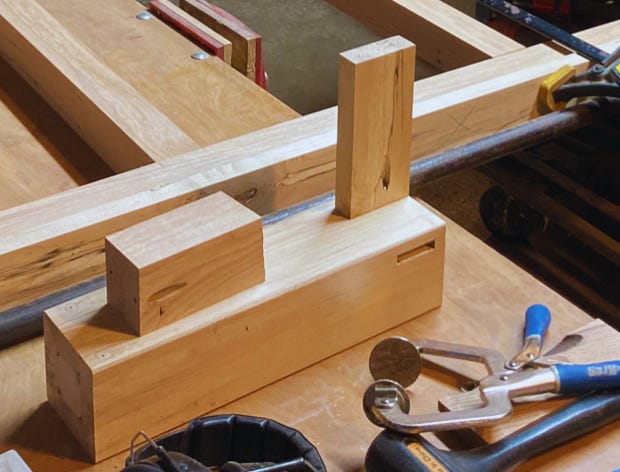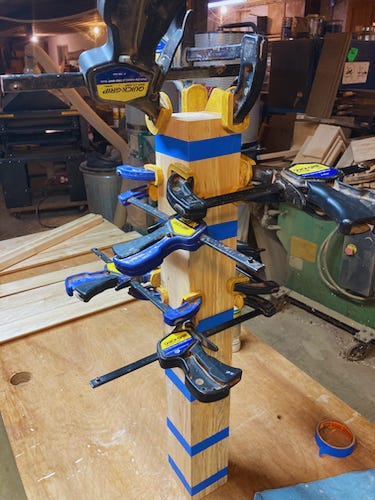A brief update: I have been learning how to flatten boards with a router. Main takeaways: it’s slow and messy. By the time my mentor and I were done flattening the board below, her shop was covered in mountains of Black Walnut dust. (And apparently I wear the same flannel shirt in every woodworking photo.)
My essay is below. If you would like to support my writing you can do so a couple of ways:
—by liking this post (clicking the ❤️ above or below)
—by becoming a paid subscriber
—by sharing this with anyone you feel would enjoy a 10-minute break every two weeks to read non-technical, semi-philosophical words on woodworking.
Thank you for being here—I hope you are enjoying the moments of your days, maybe not each one equally, but finding enjoyment all the same.
Sometimes there are no urgent cognitions. Sometimes the days are filled with simple moments strung together like Christmas lights.
A few days ago, I was standing in the shop with my dad, the dining table we’re building face down and splayed out before us, legs in the air like an overturned beetle. We were dry fitting the legs, aprons, and frame one last time, taking our final measurements (double taking them) and marking where to place the guides and rails for the extension.
“Dry fitting” is a step in the building process. It’s putting the pieces together without screws or glue. This is done when you have made joinery and want to be sure it works—the pieces come together in the way you were expecting so there are no surprises once you’ve added glue and are actually committed.
With this project, we created mortises and tenons, making the legs and aprons easier to line up and assemble.

“Mortise and tenon” is a fancy way of saying we cut rectangular holes in the legs and similar-shaped tongues in the end of the aprons. This makes the whole construction sturdier, because the legs and aprons are locked together, and it provides more gluing surface. The more places you can get wood glue, the better. If only there were wood glue for relationships, people would never break up. (Not entirely sure that’s a good thing, it’s just an observation.)
At any rate, with a mortise and tenon, when the two go together it is cause for celebration. Small bits of joy are part of my simple moments; I delight when something I’ve made actually works. It’s true that I am working with my dad here and learning from him and benefiting from his decades of experience, but for the majority of my life, I never even knew what a mortise and tenon was, let alone how to make such a joint from two separate pieces properly.
More often than not, the joint won’t align or your tenon is too fat or you realize you accidentally put the mortise on the wrong side of the leg. During a previous project I gained the valuable experience of filling and hiding an errant mortise and that’s knowledge that can never be taken away.
Back to the shop (believe it or not, this was meant to be a short essay), we’ve got the pieces dry fit and are talking through the guides (the wood pieces attached underneath the table top that the slides will, well, slide through) and the placement of the slides (the two “arms” that will be pulled out for the extension to attach to). We discussed the action and the distances and how the extension needs to fit down.
And then there was The Pause.
The minutes ticking by as we stood, silent. Both of us looking at the upturned table. Another simple moment. Me and my dad. One moment out of hours spent together just this day.
I noticed the chill in the shop, enough to slow the circulation in my hands. The lack of dust glittering in the air, as we hadn’t cut anything in awhile. The big machines and bigger piles of lumber, stacks of partially assembled joints and jigs, all the many tools we had brought to the work tables.
As we stood there, I realized that my dad was probably having useful thoughts, while all I could think about were these useless observations. Then I wondered what he was thinking. I looked at him.
There are times it’s okay to interrupt a woodworker and times it isn’t. The latter include during the operations of any machine that will cut off a body part. That’s obvious, though I’ve heard stories of friends or clients or neighbors walking into shops and yelling to get attention, not heeding the danger such an interruption can cause.
This was not one of those times. But I don’t like to be annoying. I’m aware of the grace1 of these hours.
It’s a lot of work to teach someone a skill. Though my dad is a mostly retired farmer, he has other projects to do. He balances it all without ever once showing impatience when I ask yet another question or need him to explain characteristics of this species of wood or that aspect of a joint.
He’s been by my side every step of the way with this dining table, figuring out with me what needs to be done, watching when I’m trying a new skill, giving pointers to improve my techniques.
My curiosity overcame concern about being annoying, and I interrupted the silence, telling Dad that this was our pattern, to talk and then enter quiet contemplation for an unspecified amount of time. And then I admitted that actually sometimes all I contemplated was wondering what he was thinking.
“Well, what I’m doing is visualizing how they will use the table,” Dad said, “and what will happen when they pull the slides out and put the extension down, how they’ll line it up, when the slides need to stop, and where the guides need to be.”
“I was right,” I told him, “your thoughts are much more useful than mine.”
He teased me saying that someone on the team has to be the one to think it through while the other is the one who flaps their gums all the time. Dad is ever patient, but he wouldn’t be my dad if we didn’t heckle each other.
We moved on to the next step, marking pieces of wood to cut and setting up a saw at the correct height to make those cuts. A family friend came by to drop off Dad’s wood splitter. She didn’t interrupt while the machines were running, only stepping forward after I’d turned it off. She also does woodworking, and is a farmer, so she gets it.
And that’s the moment. Nothing profound about it, or the ones that came before, or after.
It’s easier, I think, to focus on the end products, the accomplishments. But those don’t come close to comprising most of life. Hell, not even most of a given day.
Our days are generally filled with the process of whatever we’re working on or playing at or relaxing with. I realize now that what I was contemplating when I was standing with my dad was the choice to try to make a living by stringing together moments like these.
And that is an essay for another time.

This phrasing will really bop Josiah’s bippy when he reads it. He’s not a fan of terms like “grace” and “blessings” being sprinkled about lazily, so I will try not to be lazy, even though it’s winter and what I really want is to curl up under a blanket and shut out the world with a book. This footnote is mostly for Josiah, who is punctilious enough to read all the way through the end of the footnotes. If you’re reading this and you’re not Josiah, please note you are not punctilious. You are lovely and just the right amount of neurotic.








“Well, what I’m doing is visualizing how they will use the table,” Dad said, “and what will happen when they pull the slides out and put the extension down, how they’ll line it up, when the slides need to stop, and where the guides need to be.”
I'm getting to thinking that your Dad is a good man. All too rare species. But I think you know this already.
"And that’s the moment. Nothing profound about it, or the ones that came before, or after."
Amidst all the noisy bustle of the day that WAS the moment, no? Kairos. You noticed, remembered and wrote about it, because ... well, you're your father's daughter, are you not ? I've come to believe that profundity (for lack of a less pretentious word) is ... quiet, unassuming ... avoidant of words (to our chagrin, inveterate scribblers) ... rather, requiring a stillness of mind to be noticed.
I too have a dream of making tables. Big, sturdy family tables with a drawer for every one belonging to the table. A kitchen table that people gather around to eat and drink and be together. With high chairs for the messy, little kids ! I just need to teach myself to make stick chairs and I'm all set for a pensioner's pastime :-)